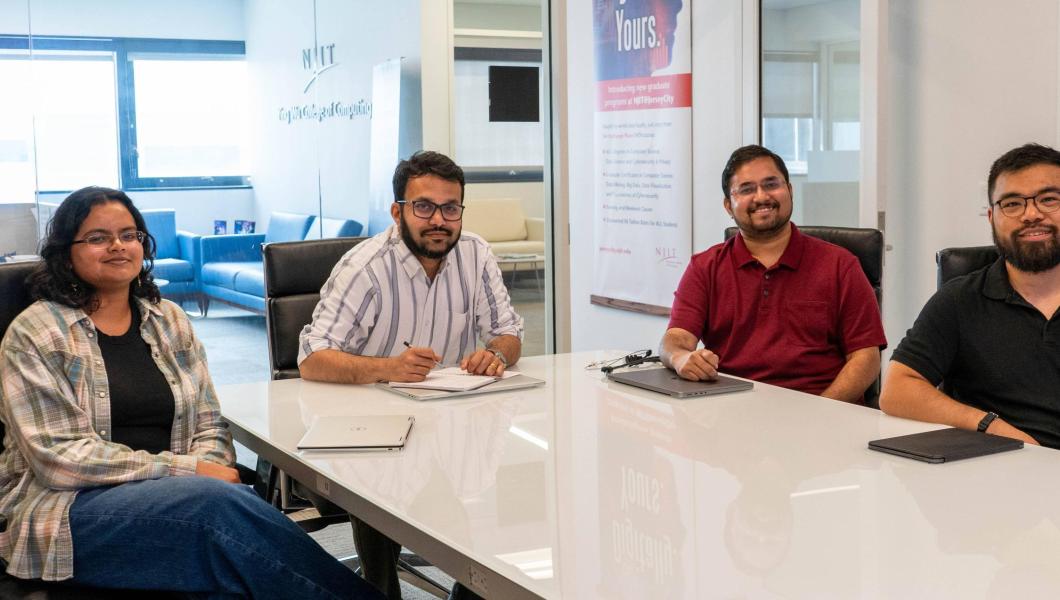Grad Student Follows His Passions in Data Science, Dilruba, Hip-Hop Music

Tejveer "T.J." Singh lives a double life that might be the envy of many other college students.
By day, Singh is an unassuming data engineer, armed with an NJIT bachelor's degree in computer science and working from home in Milltown, N.J. for a San Francisco startup company, while also still enrolled at NJIT for an online master's degree in data science. But he rarely tells classmates or faculty that, by night, he's an acclaimed alternative hip-hop artist who played the Indian dilruba at Lincoln Center, shares a producer with mainstream singer Post Malone and plans to release his first album this spring.
"Not many people have heard of the dilruba. It's a mix of the sitar and also the violin," Singh said, in explaining the context of the string instrument that's largely unknown in Western culture and deeply associated with the Sikh religion. Beatles guitarist George Harrison played it on the legendary Sgt. Pepper's Lonely Hearts Club Band in 1967.
Singh's story began at age 2 when his grandfather, a noted Sikh historian, introduced him to Indian classical music. "Usually when practicing vocals you learn an instrument called the harmonium," which is a type of pump organ, Singh said. Singh's mother received one from his father as an engagement gift instead of a ring. But the young Singh, who also listened to rap and hip-hop during his childhood in Spotswood, preferred the older and rarer string instrument.
"I started playing, I think I was 12 years old. There were no teachers around. I'm self-taught, A to Z," he said. "The first beginner dilruba I ordered off eBay. It was 300 bucks. I kept on playing and eventually a teacher of dilruba from India gifted me his own dilruba. He just gave me his, it's one of one. It's very hard to find a dilruba. Even if you find it, there's no standard of quality," Singh added.
"I started [posting on] Instagram about five or six years ago. I started it as a documentation tool just to show people that I'm learning. I was just using it to record myself every week, just to see if I would improve or not. Slowly I started improving. People wanted more recordings done." Singh goes by @TheLostStrings across social media channels.
"The sound has never really been amplified, especially in a modern way. I fuse it with hip-hop and track beats. That really caught traction with a lot of big-time producers and people in the industry and Hollywood," he said, speaking modestly about his success — Singh was invited to play at the White House during the Obama administration while still a freshman in Ying Wu College of Computing. He didn't get to personally meet the president, but soon after he signed a recording contract with producer Rex Kudo and the Rukus Avenue Radio label. He landed a ticket through those connections to attend the Grammy awards in 2020, which he said as a musician was one of the defining memories of his life. He was inside Staples Center in Los Angeles that day when news broke about basketball star Kobe Bryant dying in a helicopter crash. Singh, also a hoops fan, realized it was the same location where Bryant played and said he felt in shock as the events unfolded.
Balancing his educational, professional and musical commitments has been challenging. As an undergraduate, Singh founded the NJIT Sikh Students Association. "I would say I am under the banner of being a Sikh and being of that religion. There's a traditional way of how you would play the dilruba because it's so tied to the religion. There's a spiritual way of playing it and it's peaceful [but] I use it in a non-religious way," Singh said. "There have been differences of opinion" in his family and religious community, he joked.
Now, "No one really knows, in the school, how much of a split life I have," he said. "It's been hard splitting music and work and school and family. I'll be honest with you, about once every week my brain kind of short circuits and I have to re-map. I have a brain map app on my phone," which makes flowcharts of important tasks.
Singh hopes to one day see instruments like the dilruba in music stores, however he knows he's unlikely to become a popular music star. Beyond that, "I want to say my dream job is finding that cross between data analytics and music. So for example, a job being a data scientist at Spotify, Pandora or Apple," he concluded. "I think I'm on pace to get there."

